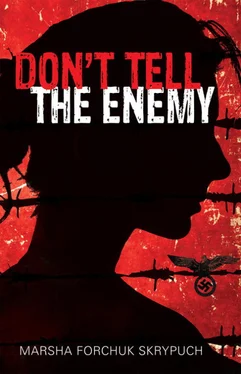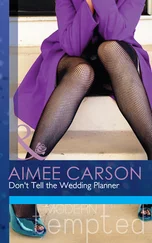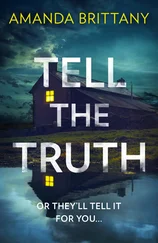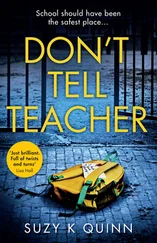The girl? Had Marga told the Commandant? How did she know that we were hiding Mr. Segal?
I had a fleeting hope that the Commandant would take pity on Dolik and Leon because they were young, but Officer Weber grabbed them and yanked them both out of the hole. That’s when the Commandant saw Mr. Segal.
He turned to me, his face mottled. “You lied .”
Mama tried to put herself in front of me, but the Commandant pushed her away. He hit me hard in the face with the side of his Luger and I crumpled to the floor. He shouted to Officer Weber, “Take the three Jews to the wagon.”
Then he turned back to us. “Show me your hidden gold, now .”
“We have no gold,” said Mama.
“Nothing but lies come out of your mouths,” he raged. “Slavs are despicable people. You wouldn’t hide Jews if not for the gold.” He strode over to the cupboard and opened it, then picked up our dinner plates one by one and flung them at us. We ducked and darted as the dishes smashed into hundreds of shards. He picked up our cups and glasses and flung them against the stove and walls. Tiny bits of razor-sharp pottery flew through the air.
He reached for our family Bible and threw it so hard onto the floor that the spine split in two. He grabbed the stack of family portraits that Dolik and I had drawn, looked through them briefly, then ripped them to shreds.
Mama and I ran out the door, cutting our feet on shards of pottery. I could feel the warm gush of blood running down my face from a cut on my cheek, and more blood coming from my nose.
Outside, Mr. Segal, Dolik and Leon were sitting in the back of a horse-drawn wagon, white-faced and silent. Officer Weber stood guarding it, but he turned and pointed his gun towards us. “Stay where you are.”
We stood there at gunpoint as the Commandant ransacked our house, looking for gold that didn’t exist.
When he came out his eyes still flashed with anger. A thin trickle of blood ran through one eyebrow where a shard of pottery must have hit him. “Take the Jews to the square. Put them with the others,” he said to Officer Weber.
Then the Commandant grabbed Mama’s elbow. “ You are coming with me.”
I followed a few steps behind them. He took Mama to the town jail. When we got inside, Commandant Hermann turned to me and snapped, “You can’t go any farther.”
As he pushed her through the next set of doors, Mama turned and looked at me. “I love you, Krystia. Find Maria. You are the bravest girl in the world and…”
The doors closed.
I waited, my eyes glued to the doors, willing them to open.
I waited for hours.
At dusk a Volksdeutche welfare officer stepped through the doors. She seemed surprised and annoyed by my presence. “What are you doing here?” she asked. “You’re getting blood all over the floor.”
I looked down. My feet and legs were covered with pinpricks of blood from the dishes the Commandant had shattered. The floor was smeared with dried blood from my pacing.
“It’s all over your face too,” she said, frowning.
I put my hands up to my face and flinched at the pain. I could trace the rivulets of sticky blood on my cheeks and over my chin.
“Go home,” said the woman.
“I’m waiting for my mother.”
“She is not leaving,” said the woman. “And I’m locking up. The Commandant left hours ago.”
How? I wondered. I hadn’t moved. He must have left by another entrance.
When I stepped out into the town square, I spotted a group of policemen guarding about thirty Jews who were clustered there.
Dolik stood among them. He raised his eyes at the sight of me. I took a few steps forward, but a policeman raised his hand and said, “Go home, girl.”
I stood there, staring at his hand, which was well-scrubbed and uncalloused. Then I looked at the policeman’s face. He seemed only a few years older than me. He had the faintest wisp of a blond moustache over his top lip. Did he not consider the evil he was a part of? How could he live with himself?
I looked beyond him. Leon stood beside Dolik now, their arms around each other’s waist. Behind them stood Mr. Segal, a protective hand on each boy’s shoulder. How I wished I could have pushed away the policeman and run to my friends. How I wished I could have saved them. I knew what their fate was. And so did they.
I could do nothing more to help them now, so I kissed the tips of my fingers and blew the kiss to Dolik. He lifted his hand as if to catch it. And then he smiled.
With wooden steps, I turned and walked back home.
Krasa’s shed door yawned open; she was gone. I checked the backyard. The chickens were also gone. I stepped carefully back into the house and grabbed the broom. I swept aside the shards of pottery so I wouldn’t cut my feet. Every curtain and sheet and blanket had been torn to ribbons. Everything breakable had been smashed. Our meagre supply of food had been confiscated.
As I swept the ribbons of bedding and tufts of feathers into one corner, I spied a bent piece of paper and picked it up. It was the photograph that Mrs. Segal had taken of me and Mama and Maria on the day the Nazis arrived in Viteretz. We had all been so hopeful then, thinking the war was over, thinking we would have our own country. How could we ever have guessed, back then, just how evil the Nazis truly were?
The photograph was partly ripped, and a giant boot print obscured Mama’s face. I brushed off the dirt as best I could and held the photograph to my heart. “Dear Mama, dear Maria, please stay safe.”
I also found Mama and Tato’s wedding photo, still in its frame, but with the glass smashed. A young and hopeful Mama and Tato stared out at me, their eyes filled with anticipation. I felt as if I had let them both down. “I’m sorry, Tato,” I said, tracing the outline of his face with the tip of my finger. “I tried to be brave, to do what was right, but it wasn’t enough.”
I gathered all the ripped pieces of the hand-drawn portraits of Dolik’s family that I could find, but I didn’t have the heart to put them together. The tattered fragments of their faces were a vivid reminder of my failure to keep them safe.
The bed frames were still both flipped onto their sides and leaning against the wall, but when I set them down on the floor, I remembered that the mattresses were now nothing but a pile of feathers. I took my two photographs and the ripped portraits with me and walked back to the kitchen. I knelt on the floor beside the hole where my friends had lived for so many months. The policeman had even destroyed the blanket and pillows that Dolik and Leon and Mr. Segal had slept on. All that was left was straw on clay.
I climbed into the hole, still clasping the photos and drawings. I curled into a ball and wept. Somehow I slept.
Chapter Twenty-Six
The Commandant
I awoke the next morning with chattering teeth, my fingers clutched around the pictures. I put them in my pocket so they wouldn’t get lost. My mind tumbled with all of the things that had happened the day before. I had to get back to the jail to see if they would release Mama.
Blood was spattered all over my clothing and feet. I’d have to clean myself before I went back to the jail if I wanted to make a good impression. When the police had ransacked our house, they’d kicked the water pail over and badly dented it, but it was still able to hold water, so I grabbed it and walked to the pump.
The street was crowded and it seemed that everyone was flowing towards the town square. The thought of why they were going there turned my stomach. Would Dolik and Mr. Segal and Leon be loaded onto the train to Belzec with the last of the Jews from our town? I had witnessed the other Aktions only so I could find out if Doctor Mina had been selected. This was an Aktion that I could not witness. I wanted to remember Dolik the way I had last seen him, standing with his brother and Mr. Segal, reaching up his hand and catching the kiss that I blew to him. And smiling.
Читать дальше



![Quiet Billie - Don't mistake the enemy [СИ]](/books/421973/quiet-billie-don-t-mistake-the-enemy-si-thumb.webp)








